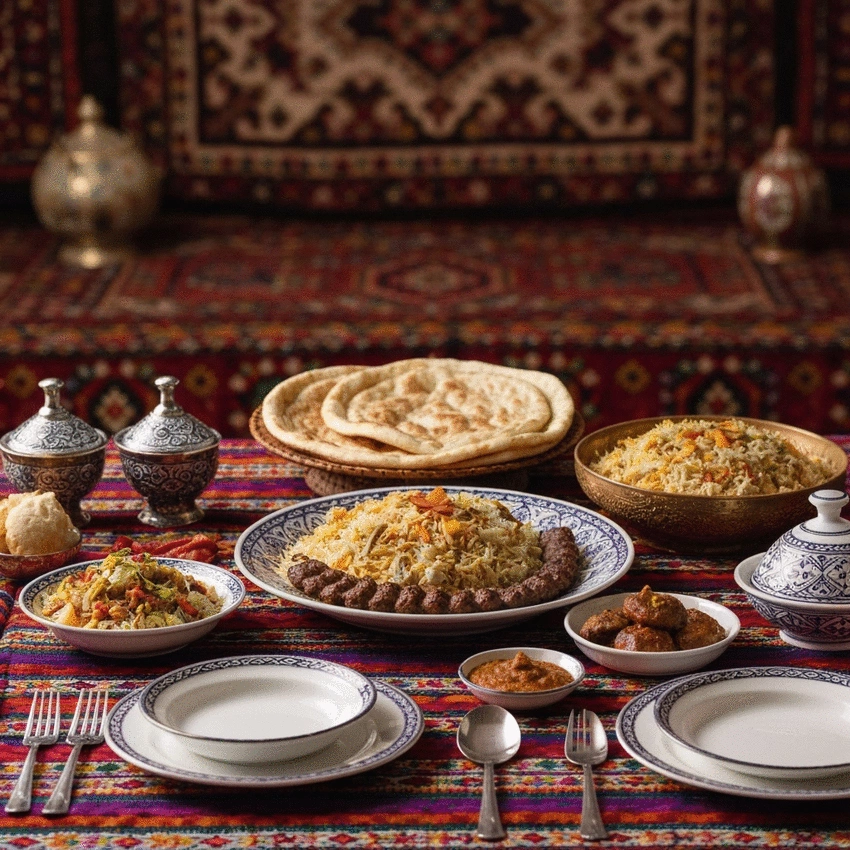Exploring Afghanistan's Natural Landscapes
By Khalid Rahimi / Feb 25
In the rich tapestry of Afghan culture, hospitality is a cornerstone that fosters connection and community. The deeply rooted tradition of Mehman Nawazi, or “guest nurturing,” invites not only warmth but also respect and generosity. The following key takeaways will illuminate the invaluable lessons in Afghan hospitality and its broader cultural significance.
Afghan hospitality, known as Mehman Nawazi, is a cornerstone of the culture, embodying respect, generosity, and community. This visual highlights its key components and their significance.
Deeply embedded concept of treating guests as honored family members, fostering relationships and genuine care.
Sharing not only food but also stories, laughter, and experiences, treating strangers as old friends.
Crucial for maintaining and passing down hospitality traditions through wisdom and experience.
Cultural rituals and dining customs that strengthen bonds between hosts and guests.
Hospitality holds a profound significance in Afghan culture, shaping the way communities interact and connect. At the heart of this tradition lies Mehman Nawazi, a term that encompasses the essence of how Afghans treat their guests. It’s not just about food and shelter; it’s a vibrant expression of respect, generosity, and a warm welcome that transcends mere social obligation.
As someone who has journeyed through various provinces in Afghanistan, I’ve witnessed firsthand how hospitality transforms everyday encounters into cherished memories. Whether you're visiting a bustling city like Kabul or a quiet village in Bamyan, the spirit of Mehman Nawazi invites you to be part of the family, even if just for a moment.
Mehman Nawazi, often translated as "guest nurturing," is deeply embedded in Afghan society. This concept goes beyond serving food; it's about building relationships and showing genuine care. When guests arrive, they are often treated as honored members of the household. This practice reinforces social bonds and reflects the Afghan value of community.
This level of hospitality is not merely a duty; it’s a source of pride for many Afghan families. I remember staying with a local family who insisted I try every dish they prepared, insisting it was a part of their tradition to ensure no guest leaves hungry or unsatisfied! For a deeper understanding of Afghan cultural practices and etiquette, you can refer to the Afghanistan Cultural Appreciation Booklet.
Generosity is woven into the fabric of Afghan culture. When you think of Afghan society, envision a tapestry rich in warmth and kindness. This hospitality culture encourages sharing not only food but also stories, laughter, and experiences. It’s common for families to invite strangers to their homes, treating them as if they were old friends.
In my travels, I’ve often been moved by the stories of families who have opened their homes to help those displaced by conflict. Their unwavering spirit showcases a remarkable commitment to generosity, emphasizing that hospitality is more than a tradition; it’s a lifeline. Information about the Afghan community and their cultural values can be found on the Indiana University School of Medicine blog.
Elders play a crucial role in maintaining and passing down the traditions of hospitality in Afghan culture. They are not just family heads but respected figures whose wisdom and experiences shape social norms. Their teachings emphasize the importance of welcoming guests and respecting rituals associated with hospitality.
During my visits, I’ve often found myself listening to the tales of wise elders who recount the rich history of their people and the integral role hospitality has played. Their narratives serve as a bridge connecting generations, ensuring that the spirit of Mehman Nawazi continues to thrive across Afghanistan.
Afghanistan is not just a land of stunning landscapes but also a treasure trove of cultural rituals that revolve around hospitality. These traditions are essential in creating bonds between hosts and guests. From the moment you step into an Afghan home, you’ll notice that every detail, especially during meals, reflects the importance of togetherness.
As we explore these customs, you’ll see how they not only enhance the dining experience but also encapsulate the hospitable nature of the Afghan people. Join me as we delve into the delightful world of traditional Afghan dining and the rituals that make it so special! Further insights into Afghan cultural practices, including dining customs, are available from the Minnesota Department of Health.
To truly embrace the spirit of Afghan hospitality, consider learning a few basic Dari or Pashto phrases before your visit. This small effort can go a long way in building rapport with locals and demonstrating respect for their culture, often opening doors to deeper connections and enriching experiences.
Mehman Nawazi is the Afghan tradition of "guest nurturing," emphasizing respect, generosity, and genuine care for guests, treating them as honored family members.
The core values include generosity, welcoming strangers as friends, sharing meals and resources, and fostering open dialogue and cultural exchange.
Elders play a crucial role by maintaining and passing down hospitality traditions through stories, modeling respectful behavior, and guiding younger generations in values of kindness and generosity.
Traditional dining customs include serving tea and sweets as a welcome, communal meal sharing to strengthen relationships, and specific rituals that highlight respect and gratitude among hosts and guests.
These items are symbols of Afghan craftsmanship and cultural identity. Carpets tell stories through their patterns, and pashmina shawls represent warmth and are often gifted as tokens of hospitality, welcoming guests into the culture.
Hospitality in Afghanistan is not just a practice; it is a way of life deeply woven into the cultural fabric. The act of welcoming guests is imbued with a profound sense of duty and respect, often seen as a reflection of one's honor. In every corner of Afghanistan, from the bustling streets of Kabul to the serene valleys of Bamiyan, hospitality serves as a universal language that transcends borders, connecting people through shared experiences.
One cannot overstate how hospitality shapes the identity of Afghan communities, inviting visitors to partake in their rich traditions. It’s about more than just food and drink; it encompasses a heartfelt connection that fosters understanding and builds lasting relationships.
Afghan hospitality extends far beyond the immediate experience of sharing a meal or a cup of tea. It symbolizes a deep-rooted tradition that emphasizes the importance of community and kinship. This cultural practice has the power to break down barriers, allowing for a genuine exchange of stories and perspectives.
Through hospitality, Afghans share not just their food, but also their stories, customs, and values, creating a tapestry of cultural exchange that enriches both host and guest.
In an increasingly interconnected world, Afghan hospitality plays a crucial role in fostering cultural exchange. It’s an invitation for visitors to engage with local communities and discover the diverse tapestry that is Afghanistan's heritage. Each plate of food served and each cup of chai poured symbolizes trust and openness that can lead to profound connections.
By embracing hospitality, visitors can not only witness cultural practices but also contribute to the ongoing dialogue that celebrates shared humanity.
Afghan carpets and pashmina shawls are more than decorative items; they are symbols of Afghan craftsmanship and identity. Each carpet tells a story through its intricate patterns, often reflecting the history and traditions of the region it comes from. Similarly, pashmina shawls represent the warmth and richness of Afghan culture, often gifted as tokens of hospitality.
When guests receive these beautiful items, they are not just receiving a gift; they are being welcomed into the heart of Afghan culture, connecting them to the stories and traditions that these items carry.
If you're intrigued by the warm embrace of Afghan hospitality, there are many ways to continue your journey of discovery. Engaging with Afghan culture is an enriching experience that can open your eyes to the beauty and complexity of this remarkable nation.
As someone passionate about exploring Afghanistan’s rich heritage, I encourage you to take the next step in deepening your understanding and appreciation of Afghan customs and traditions.
To equip yourself with a broader understanding of Afghan culture, consider exploring various resources. Here are a few to get you started:
These resources can provide valuable insights into the customs you may encounter, making your engagement with Afghan culture more meaningful.
Finding opportunities to connect with Afghan communities can greatly enhance your experience. Whether through local events, cultural festivals, or online platforms, engaging with Afghans allows for rich interactions that foster understanding and appreciation.
These activities not only broaden your knowledge but also build friendships that last beyond the initial encounter.
Afghan music and art are vibrant expressions of the country’s hospitality. Traditional melodies often accompany gatherings, creating an atmosphere of celebration and warmth. Art forms such as calligraphy and painting also play a role in storytelling, sharing the rich narratives of Afghan history.
Through these artistic expressions, you can see how hospitality is celebrated and honored in Afghan culture, inviting everyone to partake in the joy of connection and community.
Here is a quick recap of the important points discussed in the article:

 Exploring Afghanistan's Natural Landscapes
As we navigate the rich tapestry of Afghanistan's landscapes, one can’t help but marvel at the pro
Exploring Afghanistan's Natural Landscapes
As we navigate the rich tapestry of Afghanistan's landscapes, one can’t help but marvel at the pro
 Bamyan Province Travel Highlights
Have you ever considered how a single province can encapsulate the essence of a nation's history, cu
Bamyan Province Travel Highlights
Have you ever considered how a single province can encapsulate the essence of a nation's history, cu
 Afghan Culture Through Music and Dance
In times of uncertainty, the power of music and dance becomes a beacon of hope, reflecting the spiri
Afghan Culture Through Music and Dance
In times of uncertainty, the power of music and dance becomes a beacon of hope, reflecting the spiri